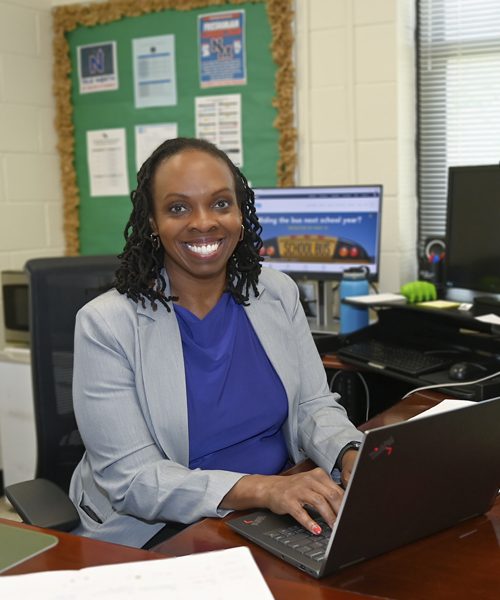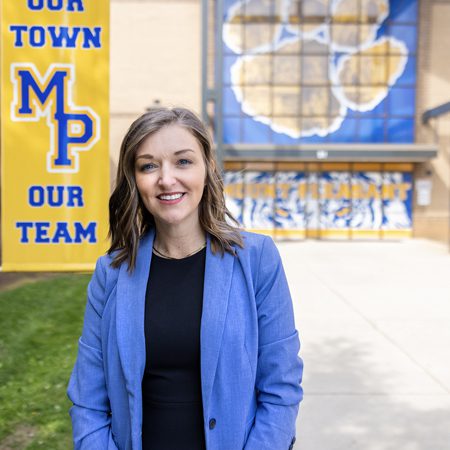Guiding Principals

Straun Alexander was in a classroom chatting with other aspiring principals when he received a tap on the shoulder. A parent needed to see him right away, he was told.
Waiting for Alexander in another room was a parent, angry because her son was suspended after getting into a fight started by another student. Alexander assessed the situation, calmed the parent down and did his best to remain composed.
The surprise scenario was a problem-solving, role-playing exercise that’s a key part of the Aspiring High School Principals Program. UNC Charlotte and Charlotte Mecklenburg Schools created the program, which recruits, trains and supports prospective principals to serve in the CMS system.
“The entire Aspiring Principals program is a lot of work. But when you are put in a position to be an administrator, you’re prepared.”
– Straun Alexander, assistant principal, Kannapolis Middle School
According to Alexander, a former postal clerk in the Navy who taught language arts and social studies to sixth, seventh and eighth graders before going into administration, having had that role-playing experience was helpful when he encountered a similar situation in his new job as assistant principal at Kannapolis Middle School.
“The entire Aspiring Principals program is a lot of work,” said Alexander. “But when you are put in a position to be an administrator, you’re prepared.”
“The one thing I liked more than anything was the real-life scenarios,” said Alexander, who is on target to finish the program in May 2024 and hopes to someday become a superintendent. “They come pretty close to what you experience as an administrator.”

Addressing a need for qualified principals
Research shows that principals are a leading factor in a school’s success. Their role is instrumental not only for student learning and attendance but also key to teacher satisfaction and retention. This means that in addition to fostering and maintaining a positive school climate, principals must be prepared to coach and evaluate teachers, facilitate collaboration and professional learning communities, and manage personnel and resources strategically.
Aspiring Principals began in 2013 with eight students. Since then, about 200 students have graduated from the program, which is taught at a CMS school. It has become so popular it has a waiting list of people hoping to capture one of the approximate 25 slots available each year.
Looking at retirements and regular attrition among its principals, CMS saw the need to better prepare more people to move into the role, especially at the high school level, said Jeveleyn Bonner-Reed, who was both the director of grant innovation and the director of human resources strategic initiatives at CMS and worked closely with the Aspiring Principals program for years. In 2022, she became executive director of the Belk Foundation, a Charlotte-based family foundation that supports public education.
“It takes a certain kind of person to lead high schools. It’s really hard to fill those positions with the best people,” Bonner-Reed said. “The schools are bigger, there’s more responsibility, you’re leading more students and staff, there’s athletics.”
UNC Charlotte was one of four universities that CMS partnered with as part of a seven-year, $7.5 million Wallace Foundation grant for CMS’s Principal Pipeline initiative, Bonner-Reed said. Aspiring Principals has continued as its own, sustainable program beyond the grant.
To help put the Aspiring Principals program together, UNC Charlotte reached out to Debra Morris, Ed.D., a retired school superintendent and former state principal of the year in North Carolina. UNC Charlotte and CMS worked with the New York Leadership Academy, which provided many ideas, such as the angry parent scenario.
“A lot of people go through class and are taught from a textbook,” said Morris, Master of School Administration graduate program director and clinical associate professor. “This is actual, practical experience.”
Participants “get to practice all of these skills and it tells them so much about themselves,” she said. “You see which people are open to feedback and which people take things too personally.”
The program consists of three strands. The UNC Charlotte Department of Educational Leadership offers a 36-hour Master of School Administration program, a 21-hour School Administrator License program, and a five-week intensive summer experience for candidates who hold a School Administrator license in Mecklenburg County.
Students in all three strands participate in the summer intensive. From the beginning, summer intensive instructors have included Rebecca Shore, Jim Watson and Marion Bish. Jamie Kudlats and Walter Hart also now share their time with the program.
Aspiring Principals is successful because it is rigorous and highly tailored to CMS’s needs, Bonner-Reed said. She added that she was impressed by UNC Charlotte’s creation of a scholarship program to encourage more Latinx teachers to strive to become CMS principals.
Aspiring Principals alumni and current participants say the program creates a supportive community of fellow aspiring principals, mentor principals and instructors. Many participants stay in touch with Morris — and one another — once they complete the program.
Making an immediate impact
Aalaa Fouly said she was nervous when she had to introduce herself to other participants. She moved to Charlotte six years ago from her native Egypt, where she had been a vice principal, and feared her English wasn’t quite up to snuff. “Everybody saw me struggling and they said, ‘Don’t worry, Aalaa, you’ve got it.’”
Fouly took part in the Aspiring Principals program from summer 2020 through spring 2022, earning a master’s degree in school administration after talking with Morris to determine the best path.
“It helps me communicate with my staff, the students, the principal, the community, and create a better plan for the school.”
– Aalaa Fouly, vice principal, Intellicor International Academy
Fouly said the program helped her to learn how to do her job better and had an immediate impact on the Islamic school where she is vice principal, Intellicor International Academy in Charlotte.
Fouly implemented much of what she learned in the program. “It is another school from A to Z,” she said. “The student handbook, the teacher handbook, the strategies, the supervision, the instruction, the curricula — everything changed.”
The school’s enrollment has increased from 50 to about 350, a growth that Fouly attributes to all the changes inspired by the Aspiring Principals program. The training “has benefited me and the whole community a lot,” she said. “It helps me communicate with my staff, the students, the principal, the community, and create a better plan for the school.”
Growing through in-the-moment feedback

Stephanie Hood, a former music teacher and testing coordinator who currently is principal of North Mecklenburg High School in Huntersville, already had an add-on licensure when she participated in the summer intensive for professional development. Hood said she would encourage anyone seeking to be a school leader to enroll in a program like Aspiring Principals.
Advisors like Morris and Nancy Bartles, co-director of Aspiring Principals, provided invaluable, in-the-moment feedback, Hood said.
“It wasn’t just about how you did on tasks,” she said. “They would tell you to be more assertive in the group or that you’ve got some good ideas, try to coach while you’re in this setting. To have that feedback on your leadership is rare.”
“It really is about your growth,” Hood continued. “The people I met in that program, we’re all still very close. We still have a bond.”
Learning ‘all the different pieces of the job’
Dan Miller loved being an English teacher and interacting closely with students in the classroom. When the school he was teaching at closed unexpectedly, he found work as an academic facilitator and dean of students. Ready to move forward in his career, he decided to pursue an add-on licensure through the Aspiring Principals program.
Miller said the program, especially the summer intensive, helped him prepare for the process of getting into the CMS assistant principal pool, and to become an effective school leader. He noted that in his first week in his first job as an assistant principal, he experienced the real-life version of the angry parent scenario.
Aspiring Principals is “all the different pieces of the job that you don’t necessarily think about — managerial, building school improvement plans, creating data sets, being able to look at the budget to say here’s how we’re going to allocate funds,” Miller said.
“I would not trade the five-week program for anything else,” said Miller, who recently became principal of Selma Burke Middle School, which is scheduled to open in Mooresville for the 2023-2024 school year.
Prepared for real life every day
Like Alexander and Miller, Lacee Jacobs found the angry parent scenario memorable — and helpful. The scenarios were recorded so all the participants could watch and give each other feedback.
“It wasn’t just reading from a book and taking notes,” Jacobs said. “It puts you in the situation and lets you practice. It was really fun.”
She spent a year interning with the entire administration team at her school and took night classes. The summer intensive involved classwork and lots of practical, hands-on experience, she said. Participants were assigned to groups and each week, one person in the group acted as principal and had to manage the rest of the team while engaging in activities such as creating budgets and building master schedules.

Jacobs graduated from the Aspiring Principals program in May 2019. The former school counselor already had a master’s degree, so the program provided her with an add-on licensure.
“I cannot imagine a program making me feel better prepared for real life every day,” said Jacobs, who was assistant principal for Instruction at Northwest Cabarrus High School when she was named the 2022-2023 Assistant Principal of the Year for Cabarrus County Schools in North Carolina. She recently became principal of Mount Pleasant High School in Mount Pleasant, North Carolina.
Not all participants who go through the program will end up becoming principals. Morris explains that the program helps some students realize their skills and talents make them better suited for different jobs in education.
“I want my students to understand this is such important work,” Morris said. “Running a school is not easy. It’s not for the faint-hearted. It is tough. But you help so many people.”
“It’s hard work, but it lets you live a life that matters,” Morris said.